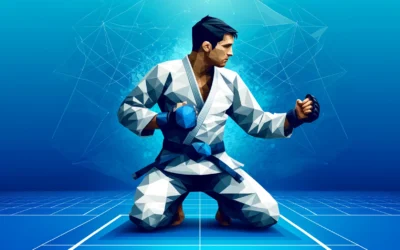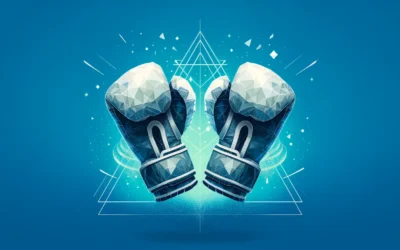Martial arts are complex and require developing many different physical and mental skills. Becoming proficient requires dedicated training over many years, but the methods and mindset you adopt can significantly impact your rate of progress. The ecological approach to martial arts training explores practical strategies for skill acquisition based on fundamental principles from sports science and motor learning. Discover how to structure your training to rapidly improve while avoiding common pitfalls that can limit your potential.
Adopt a Growth Mindset
Your mindset and beliefs about learning can significantly impact your ability to develop new skills and reach your potential. Researchers have identified two primary mindsets:
- Fixed mindset – Believing abilities are set and cannot be changed. Leads to avoidance of challenges and lower persistence.
- Growth mindset – Believing abilities can be developed through effort and practice. This leads to seeking challenges and higher persistence.
Studies show that adopting a growth mindset is critical for improving complex tasks like martial arts. Those with a fixed mindset are more likely to plateau early and avoid situations where they may struggle or fail. In contrast, a growth mindset allows you to view challenges and setbacks as opportunities for growth.
Tips for cultivating a growth mindset:
- Focus on effort and strategy over innate ability or talent
- View failure as feedback to adjust your methods
- Seek challenges that push you out of your comfort zone
- Measure progress based on your previous limits
Train Skills, Not Techniques
Many traditional martial arts emphasize learning elaborate techniques – prescribed movements for specific situations. However, research in motor learning reveals several issues with this approach:
- Brittle performance – Techniques fail if the situation differs slightly from ideal conditions.
- Lack of adaptability – Cannot adjust techniques fluidly in response to the opponent.
- Narrow focus – Movement constrained by predetermined form.
A skill-focused approach is more effective for developing adaptable, robust performance:
- Wide lens – Develop broad sensitivity to cues in the environment.
- Discover solutions – Allow unique movement solutions to emerge from live practice.
- Retain adaptability – Maintain flexibility to adjust techniques.
Master the core skills needed to solve the problems posed by a resisting opponent dynamically. The technique follows naturally from skill.
Use Games, Not Drills
Drilling techniques repetitively can give the illusion of competence, but performances learned this way tend to break down under realistic conditions. Games develop skills in the context of natural variability:
Benefits of Games
- Variable practice – Promotes adaptability by experiencing techniques in different situations.
- External focus – Attention directed outward at the opponent provides better feedback.
- Implicit learning – Unconscious absorption of cues trains automatic reactions.
- Real-time decisions – In-the-moment problem-solving accelerates learning.
- Motivating challenge – Live competition is inherently engaging and rewarding.
Well-designed games leverage these factors to develop skills rapidly.
Designing Effective Games
- Constrain the space – Limit engagement area to increase interactions.
- Set clear objectives – Define specific goals and parameters to achieve.
- Balance skill level – Match opponents appropriately to facilitate progression.
- Encourage experimentation – Allow freedom to discover personalized movement solutions.
Games turn repetitive drills into dynamic, engaging skill practice.
Take an External Focus
Attention plays a crucial role in optimizing performance and learning. Research shows that an external focus on the environment and task is superior to an internal focus on your body and movements.
Benefits of External Focus
- Enhanced motor control – More automatic, unconscious processing.
- Reduced cognitive load – Frees mental resources for quicker reactions.
- Increased situational awareness – Better perception of cues and patterns.
- Improved balance and coordination – Allows natural reflexes to guide motions.
Tips for developing external focus:
- Observe the opponent’s centre of gravity, posture, and movement.
- Feel the pressure and connection points between bodies.
- Focus on positions and motions in the space around you.
- Avoid thinking about technique names or executing specific steps.
An external focus accelerates skill gains by allowing your body to naturally self-organize reactions.
Emphasize Aliveness
Training must include free, unscripted bouts against fully resisting opponents to develop skills that transfer to live performance. This “aliveness” allows you to:
- Experience real-time reactions and decision-making.
- Adapt techniques spontaneously to dynamic situations.
- Develop timing, distancing, and sensitivity.
- Learn to merge intentions seamlessly with actions.
- Ingrain holistic mind-body connections.
Include frequent bouts of live rolling or sparring each session. Start from neutral positions like standing or kneeling to force realistic movement and reactions. Aliveness exercises skills in context and accelerates fundamental martial arts proficiency.
Review Your Training
It can be difficult to accurately evaluate your performance in the moment. Reviewing video of your sparring sessions allows you to:
- Identify strengths and weaknesses with more objectivity.
- Notice recurring patterns – both positive and negative.
- Analyze subtle details not observed actively engaged.
- Receive feedback from different visual perspectives.
- Strategize solutions to shore up vulnerabilities.
Dedicate time to analyse videos of your live training regularly. Maintain notes on priorities, progress, and areas needing improvement. Video review provides invaluable feedback for steering your development.
Train Consistently
Motor skills deteriorate without regular practice – the “use it or lose it” principle. To maintain and progress skill levels:
- Prioritize frequency – Frequent short sessions are better than infrequent long ones.
- Vary practice – Include diverse activities focusing on different skill components.
- Avoid extended breaks – Significant regression can occur after just a few weeks off.
- Cross-train carefully – Complementary activities like yoga can boost abilities.
- Listen to your body – Adjust volume and intensity to stay healthy.
Consistent practice cement skills while allowing steady incremental improvements over time. Training sporadically often results in stagnation.
The Ecological Approach to Martial Arts Training
The key principles of the ecological approach to martial arts training discussed in this article can help you enhance your rate of skill acquisition and reach your full potential in martial arts. Adopt a growth mindset, emphasize skills over techniques, utilize games for live practice, focus externally, stress aliveness, review sessions, and train regularly. With sound training methodology and dedication, your abilities will grow rapidly.





0 Comments